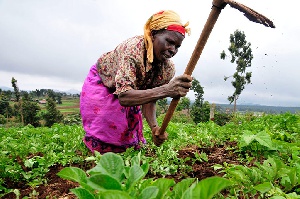The socio-economic livelihood of the people of Nassana, a farming community in the Tain District of the Brong Ahafo Region is severely distressed as they do not get value for money from their farm produce, which is their only source of livelihood.
Residents of Nassana are predominantly smallholder cassava and groundnut farmers and noted for ‘gari’ processing. Mini-gari roasting centres are visible in virtually every household, a situation that is also inimical to their environmental health -- especially with smoke pollution and open disposal of by-products in the town.
Upon realising the situation there, Action Aid Ghana has establish a gari-processing factory, located on the outskirts of the town at a cost of GH¢20,456 to regularise the business and also spare the community from further pollution. But the factory is gradually becoming a “white-elephant” as the community members rarely patronise the centre. They have cited means of transportation to convey the raw material to the factory site as a challenge preventing the people from realising the full benefit of the factory.
Speaking to the B&FT, they lamented that access to market is the major challenge thwarting the gari business at Nassana. The deplorable state of the roads leading to the community, they said, makes it extremely difficult for buyers to reach them.
The only means left them is to stock the gari till Fridays, which are traditional market days at Seikwa where commercial vehicles ply their road. A woman, Solemay Fekaa said: “We have to kow-tow to the exorbitant fares charged by the few drivers who work on the 10km road during Fridays”. The situation is not peculiar to Nassana; many communities in Tain, one of the deprived Districts in Brong Ahafo, face similar problems.
The helpless farmers and gari processors say the worst of the matter is the “insensitivity” of traders at the Seikwa market, who take undue advantage of their plight and short-change them. “The traders have the sole control over pricing of the commodity as there are always heaps of gari at the market, giving them the bargaining-power to cheat us,” they explained and further appealed to the powers that be to intervene.
In another development, there is no health facility at Nassana and residents have to travel to Seikwa to access the nearest healthcare facility. Pregnant women in labour, for instance, have to be carried on bicycles and motorbikes due to the non-motorable state to their road network.
The chiefs and people of the community have taken their destiny into their own hands by constructing a clinic to help salvage the situation. The project, which is at roofing stage, has come to a halt due to financial constraint. They have therefore sent an SOS message to government, benevolent organisations and individuals to help them complete it.
Business News of Monday, 20 January 2014
Source: B&FT

















